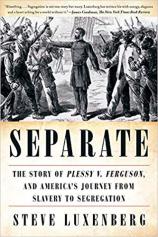Reading Group Guide
Discussion Questions
Separate: The Story of Plessy v. Ferguson, and America's Journey from Slavery to Segregation

1. Did it surprise you to learn in SEPARATE’s opening pages that separation was born in the North, on a Massachusetts railroad, in 1838? Did it set the stage for you to read the book through a different set of eyes than you might have otherwise? If so, what did you conclude?
2. A year before the Civil War, several Louisiana newspapers wrote approvingly of new laws designed to push free people of color into leaving the state for good. If you had been living at that time, in that state, what would you have done? Would your skin color have affected your answer?
3. The Civil War plays a prominent role in SEPARATE’s narrative. Two of the book’s main characters --- John Harlan, the lone dissenter to the Plessy ruling, and Albion Tourgée, the lead lawyer for the New Orleans committee that brought the case --- fought on the Union side. Henry Billings Brown, who would later write the majority ruling in Plessy, hired a substitute (as many others did). Do you think these men were shaped by their war experiences? If so, how?
4. As a young man fresh out of Yale in 1856, Henry Brown did something unusual for the time --- he spent a year traveling in Europe. He called his tour “the most valuable of my life from an educational point of view.” He proclaimed that his trips abroad gave a “wonderful expansion” to his ideas (p. 66). Do you agree? How do you think Brown was shaped by his experiences?
5. The wedding of Malvina Shanklin and John Harlan brought together two families with opposing views of slavery. Mallie said her uncle, “an out-and-out abolitionist,” would “rather have seen me in my grave than have me marry a Southern man” (p.33). When she arrived in Kentucky to start married life, she found an enslaved maid waiting to take care of her needs. Discuss how Mallie reconciled herself to her situation. Do you think her upbringing played an important role in Harlan’s evolution from slaveholder’s son to the lone dissenting judge in Plessy? Can you think of examples in your family of conflict arising from deeply held political or religious views?
6. As John Harlan recruited soldiers for his Union regiment in October 1861, he spoke to large rallies in the Kentucky countryside about his reasons for calling the Confederacy his enemy. As Luxenberg writes (p. 124), “He was taking up arms, he said, to restore the Union. He would not fight a war against slavery, and he prayed that Lincoln did not make it one.” What do you think of his stated position? Was it defensible? Do you think the Union could have been restored if slavery had been allowed to continue?
7. The marriage of Albion and Emma Tourgée was unusual for the period. Emma engages in politics and resists the idea that motherhood is her main calling. Albion tells her that too many men treat their wives only as “instruments for legally indulging” their sexual passions, which he says is “wrong, vile, inhuman (p. 159).” Do you see them as a team in pursuit of racial equality? Would Albion have been able to achieve his considerable ambitions without Emma’s help? Which is a greater factor in Albion’s character, his ego or his evolving anger at the way people of color were treated?
8. A New York journalist, in a visit to New Orleans before the Civil War, was left reeling by the city’s racial spectrum. He developed a racial classification chart (p. 90) with nine categories, “according to the greater or lesser predominance of negro blood.” What impressions did you have of les gens de couleur libres, the French-speaking free people of color? Had most of them not been free for generations, and had not amassed some wealth and education, do you think they would have organized themselves into a committee to test the constitutionality of the 1890 Separate Car Act?
9. Near the end and after the Civil War, the resurgent Republicans in Congress pushed through three constitutional amendments that fundamentally altered the original document and reversed the Supreme Court’s Dred Scott ruling. The amendments abolished slavery, confirmed citizenship for all native-born Americans, established the concept of equal protection regardless of color or race, and extended voting rights to black men. Do you think the Republicans in Congress acted too quickly? Or were the amendments necessary to end the conflict over slavery once and for all? How would you compare the current Congress to the ones of the 1860s and 1870s?
10. Congress also enacted three major civil rights bills, including one in 1875 that guaranteed equal access to public accommodations. Had the Supreme Court not overturned the 1875 act as an unconstitutional intrusion into states’ rights, do you think the country could have avoided decades of segregation, denial of voting rights, and increasing violence against people of color? Or do you think it was inevitable that the end of slavery would result in whites finding new ways to assert their dominance?
11. Had the Supreme Court had not reversed itself on segregation in 1954, what do you think our country would be like today? Do you see a connection between the white supremacists who visited Charlottesville in 2017, and the white supremacists of the 1880s and 1890s?
12. In 1875, while serving as a visiting judge in the Memphis federal court, Henry Brown engineered an invitation to a dinner with a legendary Southerner in residence there. Brown wrote later of his evening with Jefferson Davis, former president of the Confederacy: “I am bound to say I never spent a more delightful evening (p. 309).” Does Brown’s desire to dine with the enemy’s political leader say anything about his personality and temperament? Had Brown fought for the Union during the war, rather than hiring a substitute, do you think he would have been so keen to meet Davis?
13. SEPARATE introduces readers to a long line of resisters from the nineteenth century. Many pursue their fight for equal rights in court, rarely with any success. Were their efforts in vain, even if valiant? Would you have suggested a different strategy? Were lawsuits a better avenue than, say, legislation in Congress or the states? Why or why not? Do you see a connection between their efforts and the civil rights activists of the 1960s?
14. In 1883, Frederick Douglass implored a National Convention of Colored Men to take strong action against the color line, and not settle into a “servile and cowardly submission” to bigotry” (p. 362). Louis A. Martinet of New Orleans was one of the delegates. A decade later, Martinet and his committee asked for Douglass’ support for their challenge to Louisiana’s Separate Car Law. Martinet was furious when Douglass declined. Do you think Martinet was right to expect Douglass’s backing? What might Douglass’s reasons have been? What do these internal divisions suggest to you about the complicated nature of resistance movements?
15. Finding a mixed-race passenger who looked white was a central element in the New Orleans committee’s legal strategy. Tourgée and his main partner on the committee, Louis A. Martinet, planned Homer Plessy’s arrest carefully, trying to create the ideal conditions for their attack on separation. One of Tourgée’s more unusual contentions: Race is a form of personal property, and because being seen as white was economically advantageous, forcing Homer Plessy to sit in the black car amounted to a “forcible confiscation” valuable property (p. 469). Do you think Tourgée made a mistake by being too creative? Were his more conventional points, centering on the Fourteenth Amendment’s equal protection clause, overshadowed? Or do you think the case was nearly a lost cause from the outset, making Tourgée’s inventive approach understandable and even necessary?
16. Henry Brown’s majority ruling in Plessy was limited, essentially saying that the Louisiana legislature had acted within its “police powers” by enacting a law that separated the races on railroads within the state. Luxenberg’s narrative points out that Brown, usually careful to stick to the legal issues at hand, strayed into personal observations about race relations. Brown said (p. 479) that if people of color felt separation amounted to a “badge of servitude,” that was their fault, because they were choosing “to put that construction on it.” What did you think of such comments by Brown, a Northerner who spent his formative years in the company of antislavery men? Was Brown reflecting the North’s exhaustion with the “Negro question,” as it was frequently called in public debates?
17. As the lone dissenter in Plessy, Harlan cemented his reputation as a clarion voice for fairness and equal protection. What did you think of Harlan’s evolution from proslavery congressional candidate in 1859, to Kentucky attorney general opposing the three constitutional amendments in 1866, to Republican convert in 1868, and finally, to the court’s only consistent advocate for equal rights? Do you know people who have gone through such a dramatic transformation in their political views? What factors influenced them?
18. In his advance praise for the book, bestselling biographer Walter Isaacson said: “Every paragraph resonates with today’s headlines.” Do you agree? Do you see parallels between the nineteenth century confrontations revolving around separation and racial injustice, and today’s battles over questions of race? Did immersing yourself in the world of SEPARATE help you to understand the country’s continuing divisions along racial lines?
Separate: The Story of Plessy v. Ferguson, and America's Journey from Slavery to Segregation
- Publication Date: February 4, 2020
- Genres: History, Nonfiction
- Paperback: 624 pages
- Publisher: W. W. Norton & Company
- ISBN-10: 0393357694
- ISBN-13: 9780393357691







